Posted on: 12 August 2021
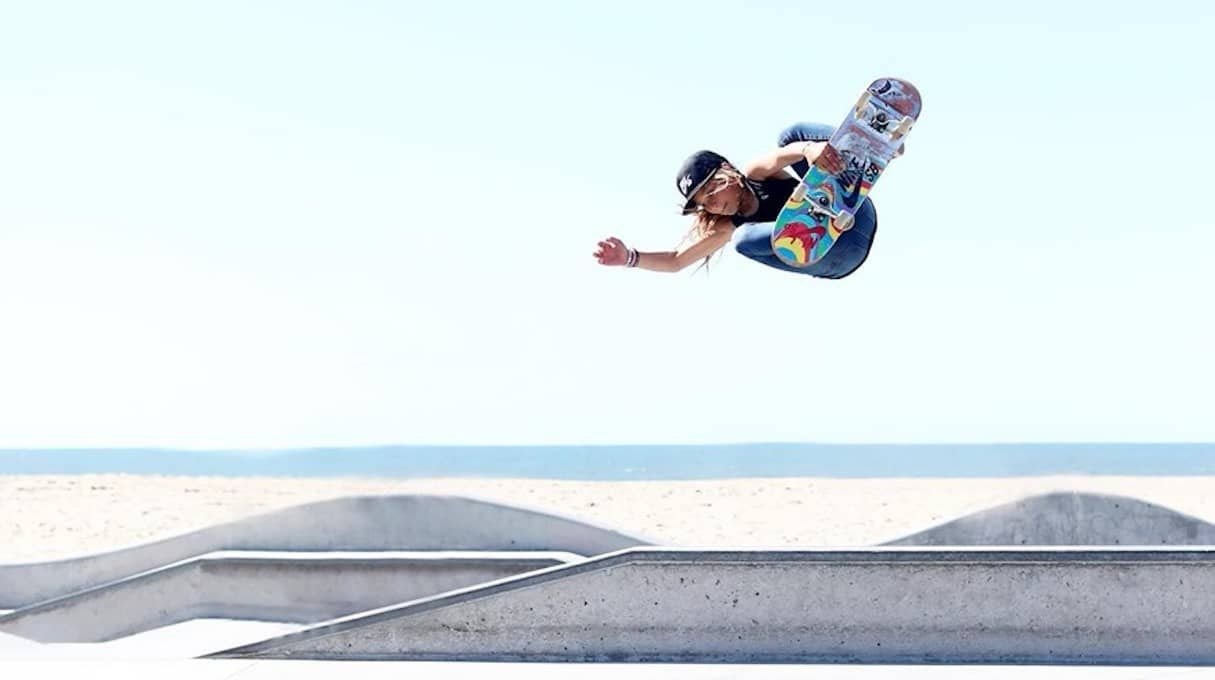 Hello there
Hello there
A little over a year ago, an 11-year-old girl was reportedly "lucky to be alive" after a horrific injury left her with skull fractures and a broken left wrist and hand. Thankfully, she made a full recovery, although within a year another injury left her with a broken arm. This also didn’t stop her though, and after winning her qualifying tournament with a plaster cast on that broken arm, she then became Britain’s youngest ever Olympic medallist, winning bronze in last week’s Women's Park Skateboarding event at the age of 13.
I am of course talking about Sky Brown, and the delayed 2020 Olympic Games in Tokyo. I find myself going through the same process every four years or so (make that five years this time round) – a muted interest in the build-up to the games, perhaps a little indifferent: then a day or two into the games themselves I’m completely sucked in! I’m checking the overnight news reports first thing every morning, I’m watching all the highlight shows, I’m staying up late to witness particular events live, I’ve got the app, and I’m suddenly an armchair expert in all sorts of sports I’ve never have heard of before…
Every time the games come round, I’m sure many of us are reminded of how they can be a beautiful embodiment and representation of the challenges faced by humanity, and how we can be inspired by seeing people triumph over them. The term ‘Olympism’ refers to the philosophy of the Olympic games, and is defined as follows:
“Olympism seeks to create a way of life by blending sport with culture, education and international cooperation. It is based on the joy of effort, the educational value of a good example, social responsibility and respect for universal fundamental ethical principles. The main goal of Olympism is to place sport at the service of the harmonious development of humankind, with a view to promoting a peaceful society concerned with the preservation of human dignity.
“A principle of non-discrimination is at the heart of Olympism. Olympism says that the enjoyment of rights and freedoms to practice sport (in the Olympic spirit, which requires mutual understanding with a spirit of friendship, solidarity and fair play) should take place without discrimination of any kind, such as race, colour, sex, sexual orientation, language, religion, political or other opinion, national or social origin, property, birth or other status.”
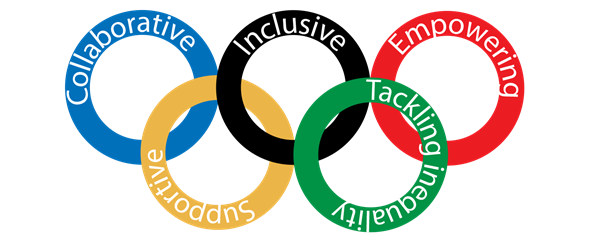
Isn’t that a wonderful design for life in general, not just sport? In every single event, every single game at the Olympics, you can find incredible, amazing stories of “superhuman” achievements – triumphs over adversity (like Sky Brown); stories of pushing through pain and heartbreak on a daily basis in order to reach a particular goal; the outpouring of emotions after years and years of effort and toil reach their climax; the agony of everything that’s gone before versus the ecstasy of personal achievement. I’m picturing Tom Daley’s tears on the podium after winning his first Olympic gold; the wild uninhibited celebrations of the Australian coach Dean Boxall when his protégé Ariarne Titmus won her event; family and friends of Tom Dean screaming support halfway round the world from a back garden at 3am, as he won his competition by milliseconds; Simone Biles prioritising her mental wellbeing and being universally lauded for doing so – and more, and more, and more.
There are many, many stories of how these incredible athletes have overcome – and in Simone’s case, for example, continue to overcome – personal challenges to reach this point (I’m not crying, it’s just something in my eye…).
There have been remarkable, tear-jerking stories everywhere you look in Tokyo over the last month.
But of course, there are more remarkable, tear-jerking stories happening to real ‘ordinary’ people in their real lives all over our district, every day.
These people don’t have camera crews following their every move. They don’t have supporters screaming encouragement in back gardens at 3am in the morning. They don’t have the eyes of the world watching their stories day in day out.
They are the ones with ‘hidden’ disabilities. They are the ‘invisible’ carers. They are the ‘hard to reach’ (and please, absolutely not the ‘easy to ignore’). They are the incredible people in our communities who overcome personal challenges every single day, just to be able to exist. They’ll likely never get medals for it (many wouldn’t ask for one either) and in many cases their stories may never be told at all. That doesn’t necessarily reflect the spirit of Olympism in everyday life, in my eyes.
That’s where Healthwatch can come in. One of our key core functions is in providing a voice for the voiceless. We strive to represent the views of the real people across our districts – to find the hard to reach and listen to them. To find the invisible and listen to them. To find the hidden and listen to them. Really listen to them, and then take what they’re saying to the key leaders and decision makers in our health and care services, and make sure they listen too.
Health and Care in England is, as we know, once again going through a massive structural reform: comparable to a permanent white-water of change that Olympic canoeists might get excited by, but most of the general population perhaps remain a little indifferent to. They just want reassurance that the right service will be available in the right place for the right people at the right time. Structural reform, reworked legislation, and updated governance arrangements alone are not going to solve any of the health and care challenges faced by real people. Inequalities, deprivation, the impact of Covid-19, and so on, won’t simply disappear overnight just because a new statutory NHS body comes into being.
But an Integrated Care System, like the West Yorkshire & Harrogate Health & Care Partnership, can certainly help in tackling these challenges head on. It can be a catalyst to forge effective partnerships, increase collaboration between those who work across health and care services, foster a stronger ‘team spirit’, and drive improvements for our people not just through wide-reaching projects but also through an "aggregation of marginal gains".
Can we, as a system, invoke the spirit of Olympism in the way we work with each other and with our communities? Can we create a way of life by blending health and wellbeing with culture, education, and cooperation? Can we base ourselves in the joy of effort, the educational value of a good example, social responsibility and respect for universal fundamental ethical principles without discrimination of any kind? And can the stories of everyday triumphs and trials from West Yorkshire and Harrogate folk inspire innovation and excellence in our work?
It seems like a good target to me. Whatever path we, as leaders, choose to follow though, Healthwatch will continue to strive to be the voice of the voiceless, and to ensure that the stories of real ordinary superhumans in our district, and the challenges they face in their real lives, continue to be heard.
Have a good weekend,
Gary and Healthwatch colleagues
What else has been happening this week?
Leeds unveils latest concept designs for two new hospitals
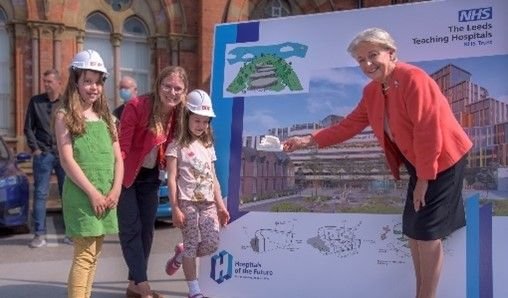 Plans for two new state-of-the-art hospitals for Leeds have moved closer with the unveiling of the latest concept designs of the new buildings – inspired by the Yorkshire landscape. The unveiling of the new hospital designs for a new adults’ hospital and new home for Leeds Children’s Hospital took place at the oldest part of the Leeds General Infirmary site – the Sir Gilbert Scott building in Great George Street where the past met the future.
Plans for two new state-of-the-art hospitals for Leeds have moved closer with the unveiling of the latest concept designs of the new buildings – inspired by the Yorkshire landscape. The unveiling of the new hospital designs for a new adults’ hospital and new home for Leeds Children’s Hospital took place at the oldest part of the Leeds General Infirmary site – the Sir Gilbert Scott building in Great George Street where the past met the future.
Major interdisciplinary practice, BDP, was recently appointed by Leeds Teaching Hospitals NHS Trust (LTHT) to lead the architectural design of its Hospitals of the Future programme, part of its long-term vision to transform healthcare facilities for patients and staff in Leeds and the wider region. Unveiling the new design concepts was eight-year-old Mia Casey from Leeds, who had heart surgery at Leeds Children’s Hospital in 2015 and whose mother, Vicky, is healthcare architect and head of business development at BDP’s Leeds studio and worked on the new designs.
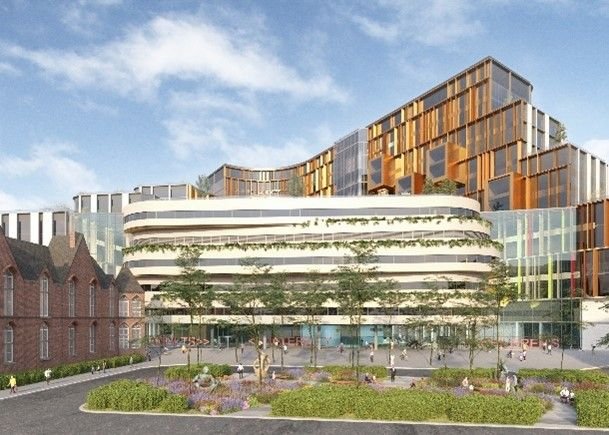 Former Leeds and Liverpool football star Dominic Matteo joined her at the design launch having received lifesaving treatment at Leeds General Infirmary for a brain tumour in 2019.
Former Leeds and Liverpool football star Dominic Matteo joined her at the design launch having received lifesaving treatment at Leeds General Infirmary for a brain tumour in 2019.
BDP proposes a hospital structure that is shaped like the contours of the Yorkshire fells and dales, with a large island garden and play deck at its centre. Outdoor space and play areas were some of the facilities that children and young patients suggested in a design competition, held last year, which have inspired the architects with their latest concept.
A central island garden takes its cues from the nearby fells, dales and erratics of Yorkshire and ward-level terraced gardens will provide a connection to the outside world for patients. The design concept draws on the Trust’s aspirations to deliver a welcoming hospital, suffused with light and fresh air with green landscapes, play areas and panoramic views that connect the building to nature and the surrounding city.
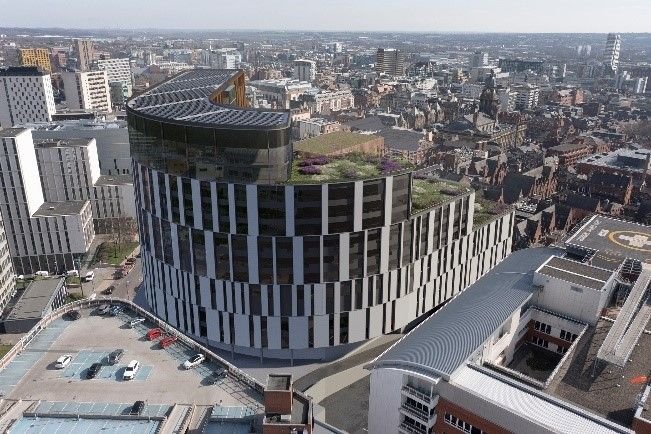 The new first design concepts take the new hospital development to the next stage but will still need detailed design development and will be used as the basis for further engagement over the next 12-18 months as the final design is agreed for the two new hospitals at Leeds General Infirmary. Building the new hospitals will release around five hectares of prime city-centre estate on the Leeds General Infirmary site which will be redeveloped as part of the Leeds Innovation District.
The new first design concepts take the new hospital development to the next stage but will still need detailed design development and will be used as the basis for further engagement over the next 12-18 months as the final design is agreed for the two new hospitals at Leeds General Infirmary. Building the new hospitals will release around five hectares of prime city-centre estate on the Leeds General Infirmary site which will be redeveloped as part of the Leeds Innovation District.
This development is expected to bring about economic benefits for the city and wider region of up to £11.2bn in net present value terms and create more than 3,000 jobs. Read all about the new design and Hospital of the Future on the Leeds Teaching Hospitals website.
Update on NHS legislation for integrated care systems
NHS England and NHS Improvement (NHSEI) have previously published the Integrated Care System (ICS) Design Framework to guide next steps in developing ICS’ in line with the Bill and the White Paper. It should be noted that until the legislation is agreed by Parliament the move to create new statutory NHS bodies to replace clinical commissioning groups remains a proposal.
Our Partnership is an integrated care system.
The national aim is to have NHS Integrated Care Board (ICB) chair designate and chief executive designate appointments made by October 2021. The recruitment process for our chair designate has begun, with the appointee ready to assume the new role from April 2022 if the Bill is passed and in a designate capacity prior to this.
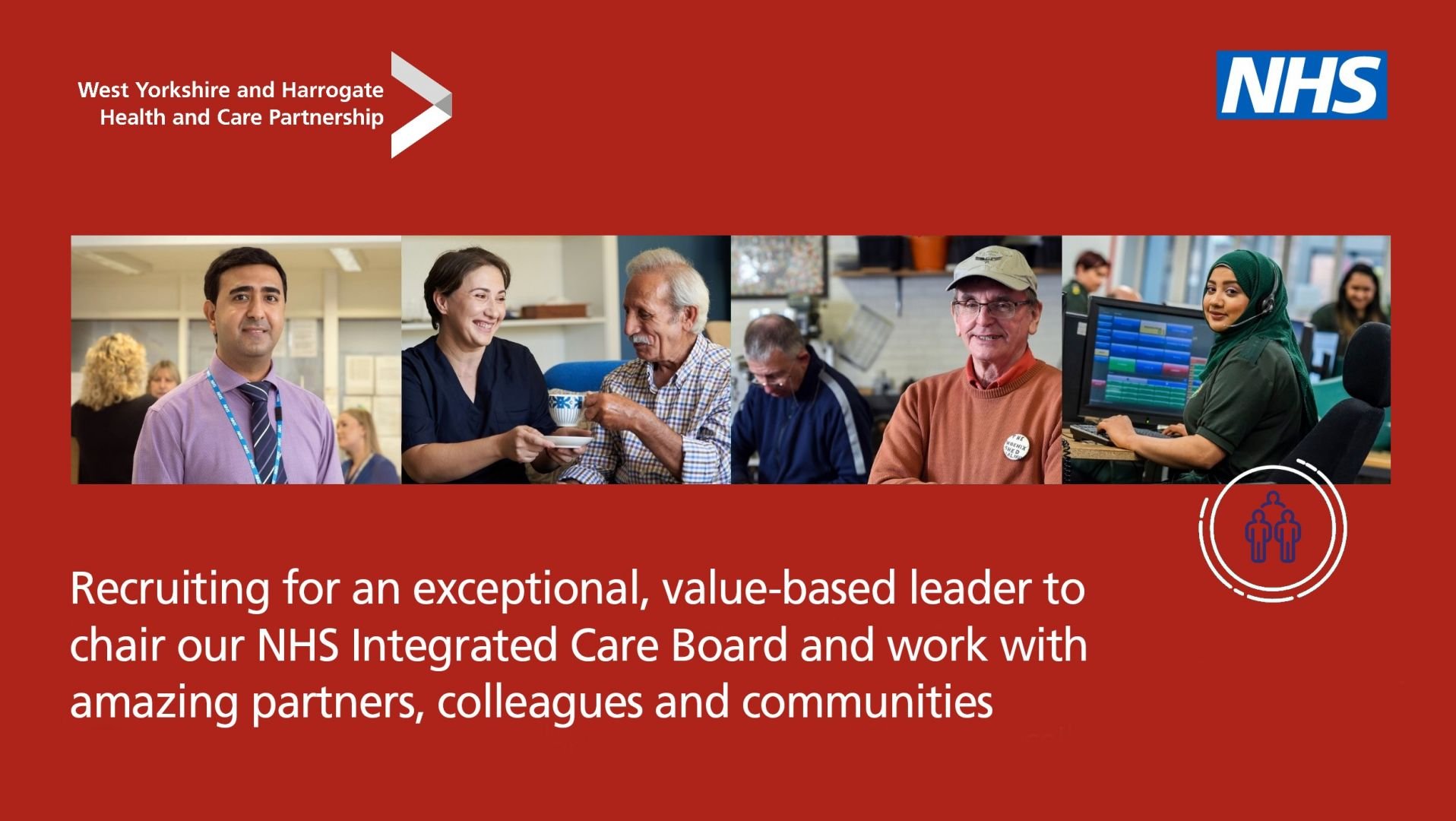 Our NHS ICS Board Chair Recruitment is currently out for advert. The closing date for applications is 17 August 2021. We are keen to ensure that a wider range of partners can be involved to reflect the diversity of the partnership and to enable a successful appointment. The selection process will include three stakeholder panels which will be held on 9 September 2021. These will consist of:
Our NHS ICS Board Chair Recruitment is currently out for advert. The closing date for applications is 17 August 2021. We are keen to ensure that a wider range of partners can be involved to reflect the diversity of the partnership and to enable a successful appointment. The selection process will include three stakeholder panels which will be held on 9 September 2021. These will consist of:
- A Citizen and Patients Panel: Which will focus on the outcomes, inequality, and citizen engagement.
- A Staff Network Panel: Which will focus on leadership style and behaviours, including equality and diversity.
- A Partnership Members Panel: Which will focus on the understanding of our system and ways of working. The interview process will be held on 14 September 2021. We will keep you updated. We are also expecting the HR framework to be shared soon, with the potential for the recruitment of our ICS Chief Executive role taking place in the next few weeks. You can find out more on the White Paper legislation here.
Primary and Community Care Board
The Partnership’s Primary and Community Care Programme Board met on Tuesday. Members discussed the future direction of integrated care systems (ICS) and the design work for primary care, how and at what scale functions might best be delivered and how capacity and resource can be maximised to best effect across our Partnership. It was noted that there is still much more work to do and we await further national guidance. The next steps include seeking the views of the Partnership’s Future Design and Transition Group soon. This group has oversight of the work taking place.
There was an update on the work on the Partnership’s inequalities review. Board members discussed the importance of equality impact assessments, and the continued focus and importance of addressing health inequalities. Board members received an update on the primary care network (PCN), clinical director reference group, which last met in July. The reference group is extremely valuable and there is real sense of excitement on how this will evolve in the future.
GP Community Pharmacist Consultation Service was discussed, particularly around the importance of primary care access. An approach to service development funding was proposed with key timescales for four areas of working. This includes GP retention, practice resilience, PCN development and access improvement. The next steps involve working up delivery plans aligned to the 2021/22 planning priorities with local place-based colleagues across Bradford district and Craven; Calderdale, Harrogate, Kirklees, Leeds, and Wakefield.
Our Partnership has received an allocation of development funding to support delivery of the 2021/22 national priorities relating to the long-term plan commitments for transforming community services and ageing well. The funding is to help developments within community health services including the roll out of two-hour urgent community response, community services input for enhanced health in care homes, and anticipatory care, for example future care needs. Our local places have developed funding proposals and are having discussions at local Ageing Well Boards (or an equivalent group). A priority will be to use the funding for urgent community response, as per the 2021/22 national planning requirement for services to be operational – 8am to 8pm, 7 days a week – no later than March 2022.
In June, a meeting was held to explore a new system-wide collaborative of providers of community health services. The purpose was to build a shared view on the value of working together, including sharing learning and mutual support. The next meeting in October will discuss areas of common interest and potential for further joint working.
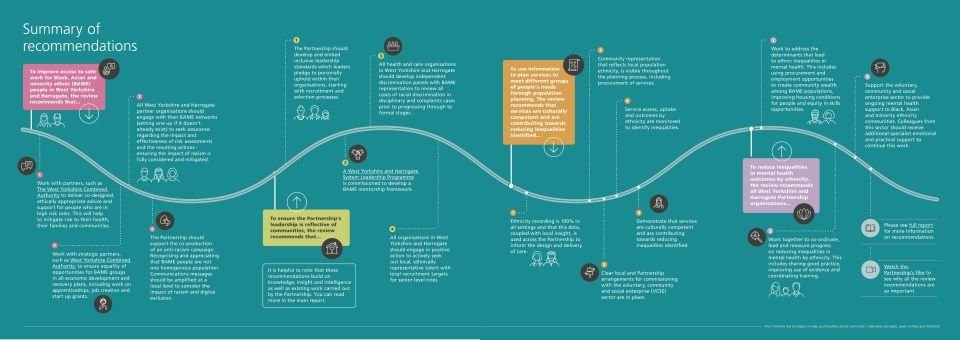
Partnership to receive over £1m from NHS Charities funding
West Yorkshire and Harrogate Health and Care Partnership (WY&H HCP) are delighted to hear they will receive £1,158,385 from The NHS Charities Together fund to support the hard work of the local voluntary community social enterprise sector (VCSE) across the area.
WY&H HCP worked through the Leeds Hospital Charity and partners to implement a robust and inclusive process with over twenty VCSE partners involved in the national funding application.
The VCSE in West Yorkshire and Harrogate is a formal partner working alongside the NHS and local authorities to meet the health and care needs of communities. They provide a connection into communities, expertise and advice and they deliver vital services, including to people least likely to access mainstream health care services. Their support has been essential before and during the pandemic. They have played a significant role in keeping people safe and well.
The funding is targeted at supporting the WY&H HCP work in tackling health inequalities across the area, through delivering grassroots help to those with long term health conditions, those on hospital waiting lists and people most at risk or experiencing poor health outcomes and reduced life expectancy.
Following an open and transparent process, the following twenty-two local projects will be allocated a share of the funds.
- Bradford Trident
- Positive Action for Refugees & Asylum Seekers (PAFRAS)
- Open Country
- Carers’ Resource
- Touchstone
- Women's Activity Centre CIC Ltd
- Holbeck Together
- Basis Yorkshire
- Bramley Elderly Action
- People Matters (West Yorkshire)
- Leeds Older People's Forum (LOPF)
- Inspired Neighbourhoods
- BID Services
- Huddersfield Mission
- Dementia Friendly Keighley (DFK)
- The Candlelighters Trust
- The Art House
- Barca-Leeds
- Rugby League Cares
- Keighley Healthy Living (KHL)
- North of England Activities and Training (NEAT)
- Leeds GATE (Gypsy and Traveller Exchange)
Official launch of 'Young in COVID' film
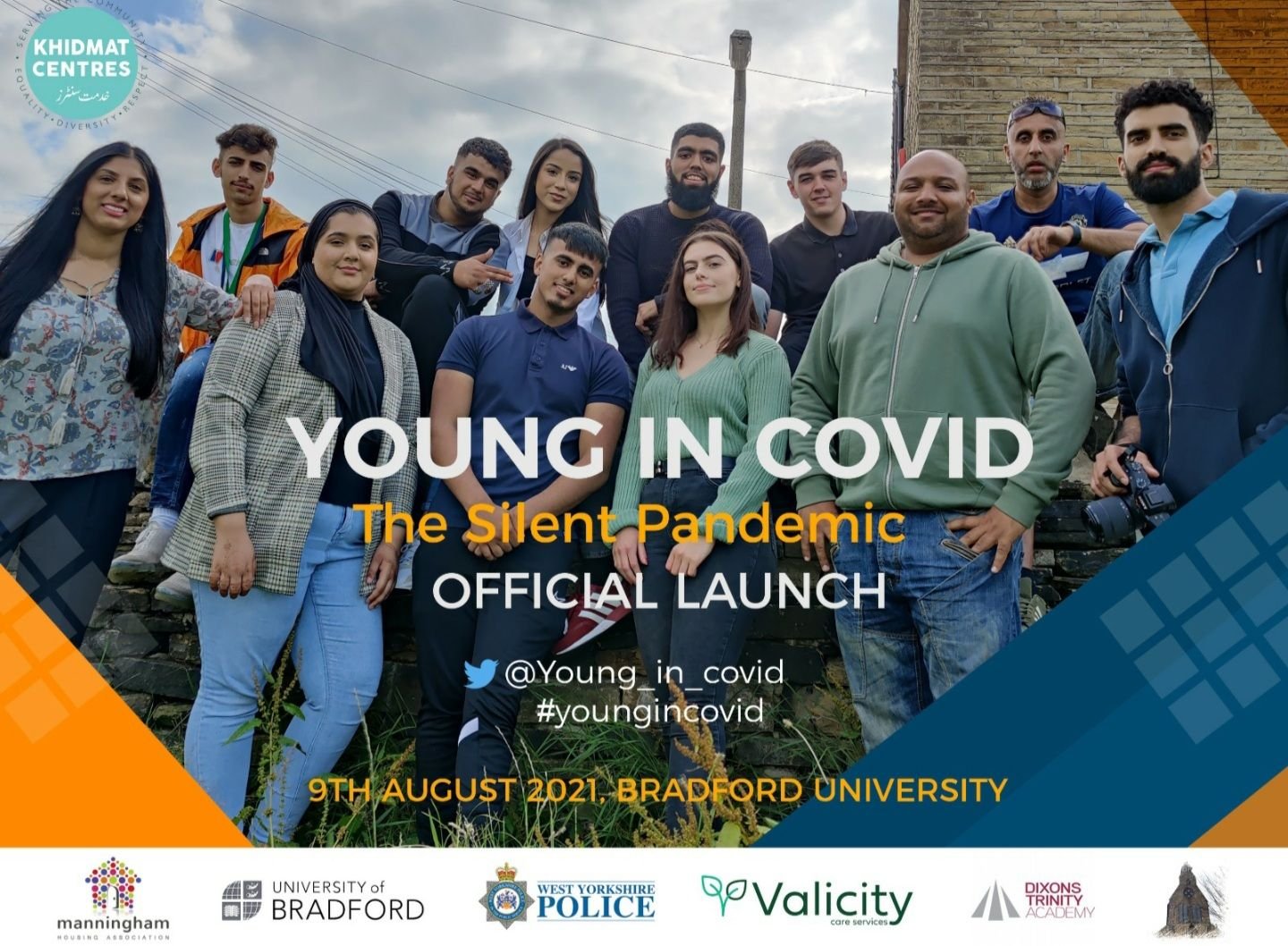 A new documentary giving raw and emotional insights into the experiences of young people during the coronavirus pandemic was launched at an event in Bradford this week. The film, produced by Bradford’s Khidmat Centres in partnership with Mary Magdalene CIC, and other partners, highlights how young people coped throughout covid, the emotional turmoil they endured and the mental and physical toll the pandemic has taken.
A new documentary giving raw and emotional insights into the experiences of young people during the coronavirus pandemic was launched at an event in Bradford this week. The film, produced by Bradford’s Khidmat Centres in partnership with Mary Magdalene CIC, and other partners, highlights how young people coped throughout covid, the emotional turmoil they endured and the mental and physical toll the pandemic has taken.
The documentary has attracted the attention of both the BBC and Channel 4, and its launch on Monday was attended by local MPs Imran Hussain and Naz Shah, Cllr Susan Hinchcliffe and representatives from Public Health England and the NHS, with West Yorkshire and Harrogate Health and CarePartnership's Fatima Khan-Shah also in attendance.
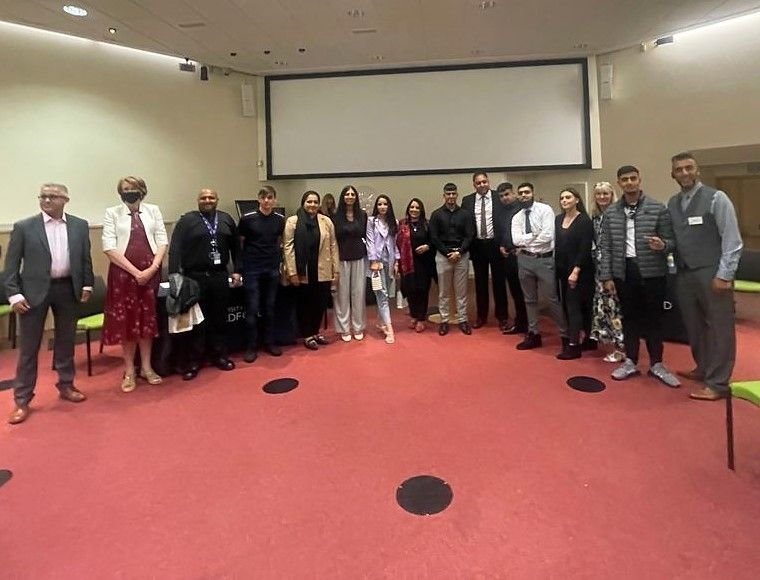 Mental Health Ambassador Muhammad Ali Islam, 18, said “I feel neglected, I feel I was one of the statistics good enough for a report but not good enough to be listened to, I feel like the whole world has stopped and blamed me.”
Mental Health Ambassador Muhammad Ali Islam, 18, said “I feel neglected, I feel I was one of the statistics good enough for a report but not good enough to be listened to, I feel like the whole world has stopped and blamed me.”
Bradford University Student Numan Arain, who worked on the production of the film, added "With this film, we've tried show how young people feel they have been failed during the pandemic and the significance of helping our future, which is young people. It truly was a powerful launch event where not a single eye was dry and not a single heart was cold. Thank you to everyone who attended."
Health and care champions (people with learning disabilities)
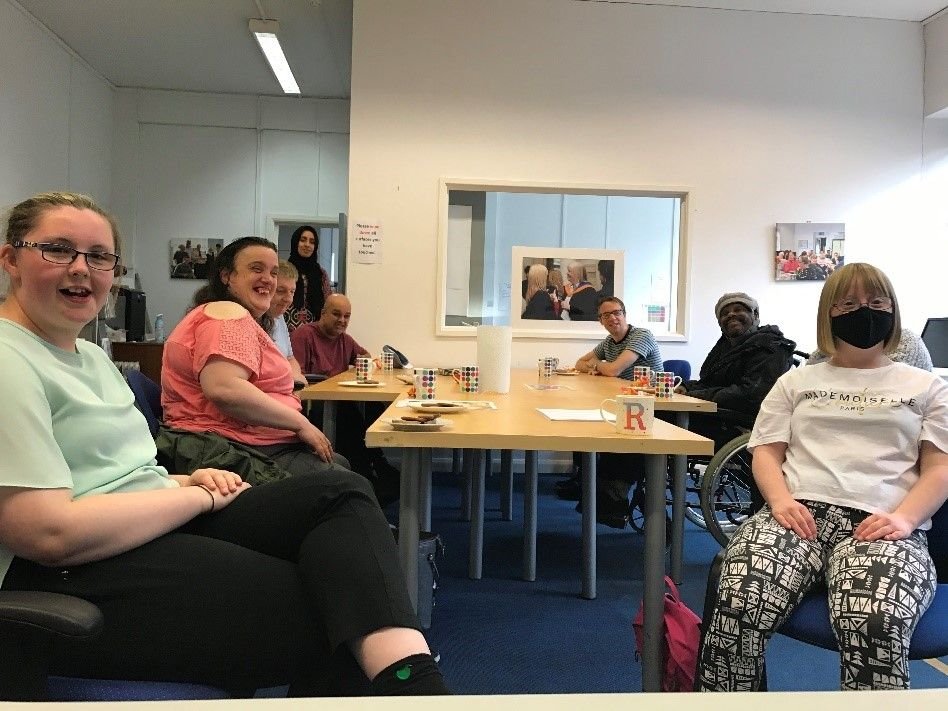
Our Learning Disability Health and Care Champions have been working hard on a number of projects for the Partnership. You can read an update for July and August 2021 here.
You can read the latest quarterly activity report (June 2021) from the Champions here.The Champions have also welcomed a new key worker, Amelia Turner, who isalso supporting the Our Lives Our Way project working with people with a broad range of disabilities to become more independent.
Mental Health and Wellbeing Hub
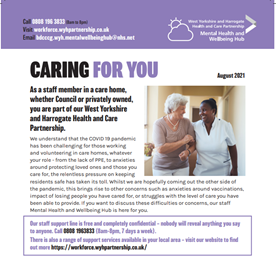 Our newsletter for care homes is out now. You can read the newsletter here and the covering letter from our consultant psychologists.
Our newsletter for care homes is out now. You can read the newsletter here and the covering letter from our consultant psychologists.
A pack of printed materials about the Hub will be sent to all our care homes next month and we are making a podcast about the issues and challenges facing care home staff because of the pandemic.
The 'About the Staff Mental Health and Wellbeing Hub' slide deck is now available for download in pdf format.
Health Equity Fellowship Programme
Our Health Inequalities Academy aims to equip all staff with an understanding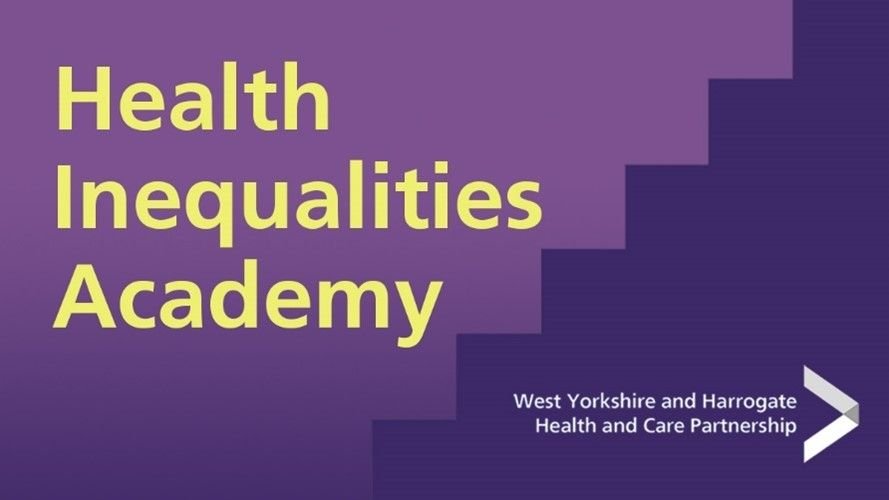 of the individual and collective action we can take to create a more equitable health and care system.
of the individual and collective action we can take to create a more equitable health and care system.
One of the initiatives we are looking at includes a Health Equity Fellowship Programme for West Yorkshire and Harrogate. This mechanism will seek to provide Public Health Foundation Training initially to 30 Health Equity Fellows which they will undertake alongside the delivery of practical projects within their area of work. Watch out for more details coming soon.
Leeds passed the one million vaccine doses milestone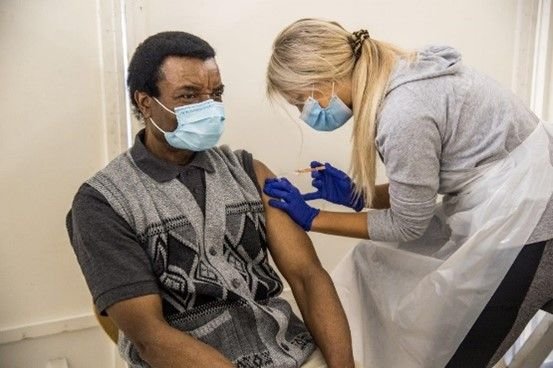
Leeds has reached another milestone in the fight against COVID-19, as the NHS vaccination programme in the city has now passed the one million doses milestone.
You can read more about this story on the NHS Leeds Clinical Commissioning Group website.

